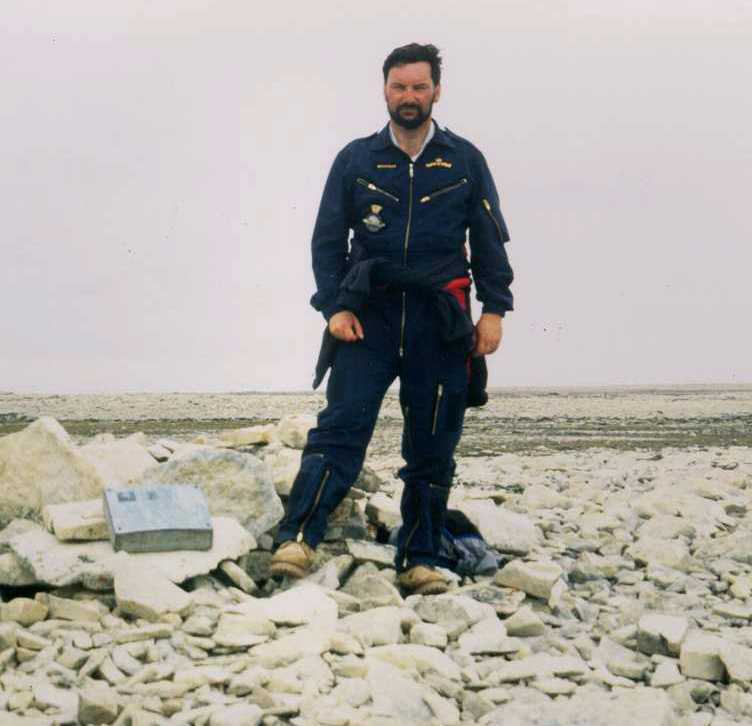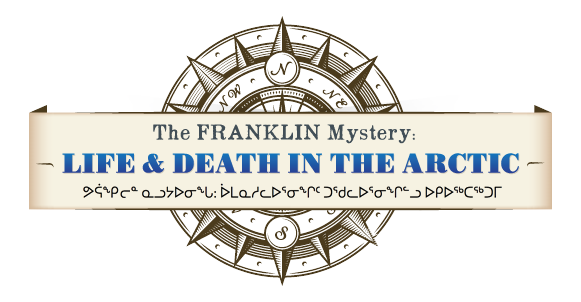Interview with David Woodman

David Woodman led a series of Arctic expeditions in search of evidence on Franklin's missing ships and men and authored Unravelling the Franklin Expedition: Inuit Testimony, based on 19th century Inuit testimony.
Lyle Dick – Interview with David Woodman, noted author on the history of Sir John Franklin’s last expedition and author of the book Strangers Among Us.
1) When and how did you first hear of the missing expedition of Sir John Franklin?
I went to U of T, and I remember very distinctly, one Friday night I was walking out of the John Robarts library there and in the bin of books to be returned to the shelves, which you’re not supposed to actually mucker with because they’ve already been done, right on top was a book called The Voyage of the Fox. And I was a great Conrad fan, I had read anything that started with “The Voyage of” would grab my attention. So I picked it up thinking it was a fictional book and, of course, it’s the account of McClintock’s expedition that found the first remains of Franklin’s expedition, which I had probably been taught about in Canadian high school history but had forgotten. Right in the middle there was the Victory Point record, saying that the ships had been abandoned at this position. As a nineteen year old, I thought “well this is even easier than I thought. I just have to go to that place, maybe dig a hole in the ice, dive down, find a shipwreck and I’m done!” So I filed that away and started reading about Franklin’s expedition, totally focused on where are the ships. I was not interested in the disaster, I was not interested in the overall parameters of exploration history, as a scuba-diving teenage young man, all I wanted to do was find the ship, put my flippers on it. I was never a collector, I didn’t want to take pieces of it or anything; I just wanted to go there, find the ship that no one else had found and then come home and tell all my diving buddies that I’d found it!
2) What happened to Franklin's party?
In one word: too much geography, too little time. I think they were put into a no-win situation. I think that if you crashed a modern airliner in the west coast of King William Island now with twenty-nine of us and offered us no support, we would all die too. They were trapped: they were caught by a very cruel nature in that Peel Sound usually is open in that period. Now it’s almost always open but in that period, the 1840s, it was open about eight years out of ten and the other two years it was completely solidified. They sailed down during an open year, it solidified after them, and stayed solid every time someone came to look for them. So that everyone who came to look for them, they looked down Peel Sound and thought, well they couldn’t have gone that way, and looked somewhere else.
3) Why did they fail?
As I say, we would fail too, given their technology, without helicopters to come rescue us. There is a flavour in the more modern era to try and blame their decision-making or their technology. To a certain extent, the technology was simply inadequate: leather boots and woolen clothing, the very first tinned food and not a lot of it, very inefficient coal engines- part of that is definitely to blame. Part of it, another flavour is that there were too many of them and on too big ships.
4) Where are the ships?
So I think one of the ships will be found in Erebus Bay within sight of the Boat Place and that will be the one that sank quickly. Then they talked of another boat all by itself, much farther south in Wilmot and Crampton Bay near O’Reilly Island or Grant Point. The geographical pointers are ambiguous.
5) How do you know?
I don’t know. Nobody knows. My slant, my window into this mystery has always been through the Inuit testimony. Correlating who told who what, looking for the telling details, how many days did they walk between this camp and that camp, what did they find at that camp. You have to also filter the fact that to an Inuit any white man’s camp is going to look basically the same, any white man is going to look basically the same, any ship is going to look basically the same. And their world view is not our world view when it comes to chronology and geography so you have to, first of all, approach their tales with a bit of skepticism and say “Am I hearing about Parry in [1833] or am I hearing about Ross or could this be Franklin?” So the filter I used was to study all of the records of the known Arctic explorers, the ones that they brought back, and try and find any details that could not apply to them, with the assumptions that of there were details that could not apply to something we know, it’s almost like the Sherlock Holmes thing, perhaps they applied to Franklin, the only expedition where we don’t have the answers.
6) Why do you care?
I would like to say I had a great calling but I wanted to find a wreck, as a young man. I became interested in the story as a middle aged man. And now as an old man, I try and justify all of the effort and thought that I put into it in some way- as the fact, that some people are called, or put in a position to push the boundaries of human experience. They go to the moon, or they do something extraordinary that the rest of us don’t get a chance to do or don’t want to do. They put themselves out there. And if they die and we don’t know what happened to them then we sort of have a debt to pay: we have to try and find out what happened to them.
7) What is the significance of Franklin's last expedition?
This is a tough one because I know why it’s significant to me but I have a very hard time explaining why it’s significant to anyone else. I think Margaret Atwood and some others have done [a] much better job of weaving the Franklin narrative into Canadian history and world history and exploring how partially the mythology has helped shaped Canada. Our prime minister right now is building a narrative for Arctic sovereignty on the explorations of a group of British sailors. There’s various levels of significance: all the way from mineral rights and Arctic that is opening up with global warming to whatever. I think the main significance to me are the stories. I think it’s almost Homeric in its scope. It has its own Penelope, Lady Franklin waiting at home, it has so many elements of cannibalism and exploration and man against nature that it’s sort of a timeless story. Once you get into it you find echoes of it everywhere. So that’s the significance to me and I think that once people do get their teeth into it, a lot of them seem to become a little crazy about it.


